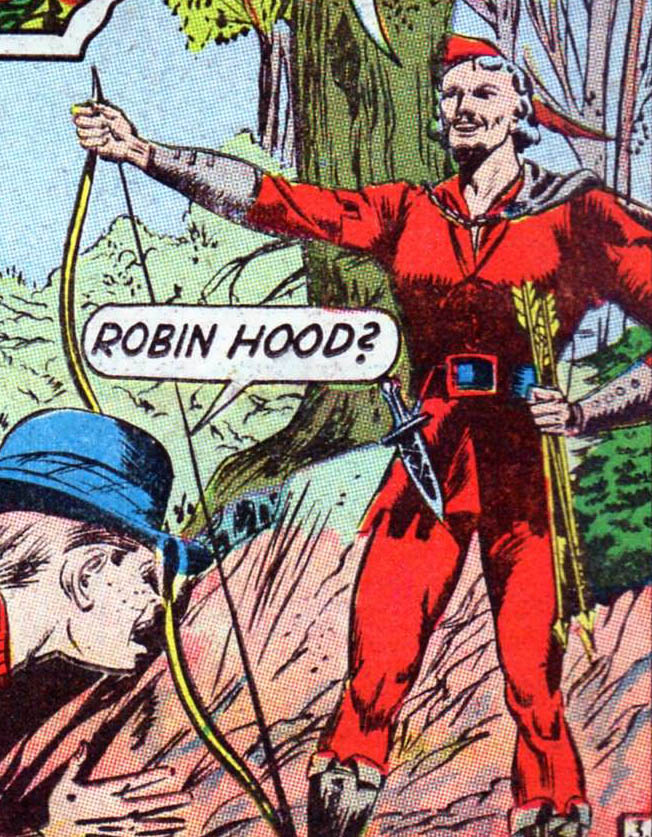This post is about justification: the justification of perceptual demonstrative beliefs by uptake from perception, and of many of the beliefs we express using proper names by uptake from testimony. What I’m about to suggest is perhaps a little surprising. But I also suggest that extant attempts to explain how justification works in these fundamental cases have proven unsuccessful, so a surprise is a good thing.
To get ready for the surprise, consider Robin Hood shooting at a target. Robin intends to hit the target. His intention generates a stream of information processing – putting the arrow to the string; pulling the string back; adjusting angles; letting fly. Just the fact that Robin’s behaviour here is generated by his intention provides one respect in which it is in normative good order: it is behaviour for which he has a reason (the reason is his intention – I’m following Anscombe here). But Robin is a skilled archer. So in usual cases where he forms a target-hitting intention, the information-processing the intention generates in fact does result in a target-hitting. And that gives us another, stronger, respect in which his behaviour is in normative good order: his behaviour is not only generated by an intention, but is a reliable generator of this intention’s fulfilment.
And here is the surprise itself. I suggest that the story about justification for the beliefs we standardly form by uptake from perception and express using ‘this’ or ‘that’ and those we standardly form by uptake from testimony and express using proper names has something like this same structure. Forming a body of beliefs you would express using a perceptual demonstrative or a proper name is an information-marshalling activity. This activity is guided by background motivational state: we are trying to tune in on the world around us, to achieve cognitive focus on objects out there in the world. Our information-marshalling has one kind of justification just in virtue of being guided by a motivational state (compare – Robin’s behaviour has one kind of justification just in virtue of being guided by his intention). But we are naturally skilled cognitive agents: our ‘trying to achieve cognitive focus’ information-marshalling usually does achieve cognitive focus. So this information-marshalling is also ‘justified’ in a stronger sense: it is generated by a goal-representing state of the subject, and is a reliable generator of this state’s fulfilment.
Here’s the suggestion put in more intuitive terms. The mind really really needs to think about things outside itself. It’s bombarded with incoming information from perception and testimony. It crunches the incoming signal into bodies of beliefs of the kind we use terms like ‘that’ and ‘Bertrand Russell’ to express. This crunching is our attempt to achieve cognitive focus. The normative story for the resulting beliefs is grounded in the facts that we are trying to reach out and seize subject-matter for thought, and are naturally skilled cognitive agents whose attempts to achieve cognitive focus on things outside the mind usually succeed.
Next time I’ll fill in some details for the perceptual demonstrative case.


Hi Imogen, this is really interesting. How seriously are we supposed to take all the agency-talk here? (It seems like the answer is: Really seriously. And I myself would have no problem at all with that.) I mean, a standard way of thinking about thought has it that beliefs are just states that are produced in the mind in virtue of e.g. perceptual input — which I suppose is part of what makes it seem inescapable that reference has to be secured either by descriptive content or by a causal chain. But seem to be saying something very different: whereas on your view the “incoming signals” of perception, testimony, etc. are (I take it) the passive result of causal processes, and thus (I assume) any story about the representational content of e.g. perception will likely be a causal one, you are proposing that in belief we do something different, actively “reaching out” to focus our thoughts on certain of the objects that have affected us. And indeed you seem to think that this active reaching-out is an *intentional* activity, or at least one that is motivated and informed by reasons or intentions.
Am I right to read all of this into what you are saying? And, if so, what would you say about the fact that so much of our thinking seems, well, passive and automatic and non-intentional?
Thanks John.
You’re spot on with respect to the importance I’m assigning to agency talk: I’m suggesting that the justification for our most basic ‘That is F’ and ‘NN is F’ beliefs rests on the fact that formation of a body of such beliefs is an information-marshalling activity, guided by a motivational state of the subject. However, I’m not suggesting that this activity is *intentional*, where an intention is a propositional attitude. That would entail that there’s a kind of propositional attitude more fundamental than our most basic ‘That is F’ beliefs. Instead, I’m claiming that the guiding motivational state is what I call a ‘need’ – a motivational state which guides action (like an intention does) and has fulfilment conditions (like an intention does), but which is non-conceptual (being motivated by a need doesn’t require the conceptual sophistication to grasp its fulfilment conditions).
I *think* doing things in terms of needs makes a difference with respect to your ‘seems passive’/’seems automatic’ point: much of our need-guided activity seems ‘automatic’; though it also has a motivational phenomenology (it is uncomfortable to have an unfulfilled need, and a relief when the need is fulfilled etc.).